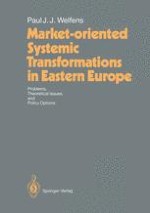1992 | OriginalPaper | Buchkapitel
Privatization and Foreign Investment in Eastern Europe
verfasst von : PD Dr. Paul J. J. Welfens
Erschienen in: Market-oriented Systemic Transformations in Eastern Europe
Verlag: Springer Berlin Heidelberg
Enthalten in: Professional Book Archive
Aktivieren Sie unsere intelligente Suche, um passende Fachinhalte oder Patente zu finden.
Wählen Sie Textabschnitte aus um mit Künstlicher Intelligenz passenden Patente zu finden. powered by
Markieren Sie Textabschnitte, um KI-gestützt weitere passende Inhalte zu finden. powered by
Having experienced a decade of economic stagnation and increasing political and economic disruptions the East European economies — including the republics of the former USSR — have finally decided to radically change their socialist economic system and move towards a market economy. In order to achieve a market-based system a lengthy transition process must be endured in which new institutions are created, the distortions of the command economy removed and the supply-side is reorganized in a way that economic resources are efficiently produced and distributed. This transition period to a market-based system necessarily cannot be characterized by the same economic and political principles as those shaping the desired new market economy. Even the case of the former GDR is not a pure big leap strategy, although the introduction of West Germany’s institutions and laws in the context of economic union on June 1, 1990 and political union on October 3, 1990 brought a radical regime switch for Eastern Germany; this switch, however, was mitigated by transitory regulations in many fields (e.g. environmental protection and labor market regulations) and a massive West-East transfer of resources in the united Germany. The privatization process as a centerpiece of systemic change was organized by the Treuhandanstalt (“THA”, a public entity under the supervision of the Bundesministerium der Finanzen) and has made considerable progress within two years: the so-called small privatization in the retail and small service industry has been fully completed, while the “big” privatization of industry has made progress to the extent that 1/2 of the some 11,000 firms had been privatized by the May 1992 (accounting for roughly 40 % of all jobs in THA enterprises). West German firms clearly dominated as buyers of privatized firms, i.e. they accounted for 90 % of the assets that were privatized. Foreign investment has so far played a minor role even in the manufacturing industry and in the services industry where West Germany traditionally has recorded a high stock of inward foreign investment.
